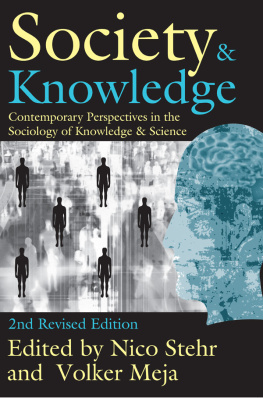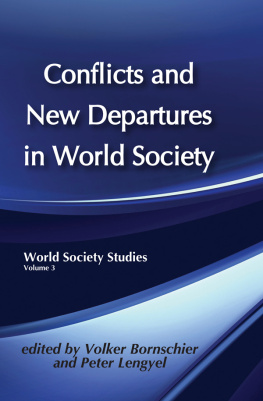WESTERN SOCIETY IN TRANSITION
WESTERN SOCIETY IN TRANSITION
Volker Bornschier
First published 1996 by Transaction Publishers
Published 2017 by Routledge
2 Park Square, Milton Park, Abingdon, Oxon OX14 4RN
711 Third Avenue, New York, NY 10017, USA
Routledge is an imprint of the Taylor & Francis Group, an informa business
Copyright 1996 by Taylor & Francis.
Published in German as Westliche Gesellschaft im Wandel by Campus Verlag, 1988.
All rights reserved. No part of this book may be reprinted or reproduced or utilised in any form or by any electronic, mechanical, or other means, now known or hereafter invented, including photocopying and recording, or in any information storage or retrieval system, without permission in writing from the publishers.
Notice:
Product or corporate names may be trademarks or registered trademarks, and are used only for identification and explanation without intent to infringe.
Library of Congress Catalog Number: 96-389
Library of Congress Cataloging-in-Publication Data
Bornschier, Volker, 1944
Western society in transition / Volker Bornschier.
p. cm.
Includes bibliographical references and indexes.
ISBN 1-56000-227-1 (alk. paper)
1. Social history20th century. 2. Economic history20th century. 3. Social change. I. Title.
LB191.S652 1995
306.0904dc20
96-389
CIP
ISBN 13: 978-1-56000-227-7 (hbk)
CONTENTS
Part I
The Argument Spelled Out
Part II
Discontinuities and their Links
Part III
Shaping Institutional Orders
Part IV
Convergence in the West?
Part V
Present Transformations and Future Competitive Edges
To explain what has been happening in the Western world a novel argument is advanced. The core countries, grouped around the triad formed by the United States, Japan, and the European Union, have experienced successive waves of change marked by phases of ascent, unfolding, and decay of societal models, generally over five to six decades. The latest model, based on Keynesian economic management, has been in its decaying phase since the 1980s. As a result, we are living through a crisis of legitimation characterized by acute contradictions. A new order, with a fresh basic consensus around an overarching set of norms that allows problems to be solved efficiently, has not yet crystallized.
A number of key areas, from the prevailing technological style, educational systems, power structures, the market, firms, and state-formations to modes of conflict and their resolution are examined in detail in a cross-national comparative perspective. These enable an order to be sustained, itself an indispensable resource from which the core countries derive many advantages. Much empirical evidence to support this case is presented, along with historical references going back several centuries. What the new order may turn out to be is as yet unclear, but there are certain indications of its probable shape. Since all core societies are now democratic, armed conflict between them is hardly likely. Nor will a single power dominate in future. Instead, there will be rivalry within the triad, distinguished by the relative decline of the United States, the competitive technological edge of Japan, and the attractions of the European welfare state, leading both to anticipated degrees of convergence and certain divergences as its world environment evolves following the collapse of the state-socialist counter-core.
This book is a completely reworked, updated, and extended version of the original German edition of 1988, Westliche Gesellschaft im Wandel. Many of the materials and empirical details included in the earlier edition had to be cut in order to create space for new materials covering recent developments. Therefore, citations of the German edition indicate that a more detailed empirical treatment of a particular point may be found there. The predictions of the original version, however, remain unchanged, although they seem much less controversial now than they did during the mid-1980s when I first proposed them in the original book.
Acknowledgements
My collaborators and many of my colleagues and friends have stimulated my ideas over the years and I owe a lot to them. A long list of their names acknowledging their valuable support is provided in the preface to the original German edition. The American edition, however, would not have been completed without the encouragement and help of Peter Lengyel, the former editor of International Social Science Journal and present co-editor of the World Society Studies series. His enthusiastic comments on the original manuscript in 1987 were a welcome encouragement after so many years of work. Even if his judgement, which appears on the cover of the German edition, was much too flattering, Peter Lengyel immediately thought it essential for this book to be translated into English. Other already promised publications, research, and teaching responsibilities, however, as well as my illness in 1990 prevented me from going ahead with that project. When it was resumed in 1993 it became clear that the result was in many ways a new book. In reviewing the original materials, cutting them down, and adding fresh materials from my ongoing lectures as well as my new articles, I enjoyed the help of Hanspeter Stammmy collaborator at the Sociological Institute of the University of Zurich. Hanspeter Stamm then put together the new chapters of the English-language edition, which I reworked while they went back and forth to my friend Peter Lengyel in Paris. With his many valuable suggestions, Peter Lengyel considerably improved the clarity of argument as well as the English style. For the updating of data and figures as well as for formating I benefited from the help of Bruno Trezzini, another of my collaborators in Zurich. In implementing the many corrections and changes, as well as in subsequent proof reading Hildegard Khler, also a collaborator in Zurich, was of great help. In doing this valuable work she was assisted in a first phase by Rachel Matthey. Finally, I benefited from the copy editing done by Richard Schauffler in Washington, who also offered many valuable suggestions and raised questions which pointed to shortcomings and thus helped to clarify and improve all the chapters in their latest stages. Simon Parker in Zurich read the proof of the whole manuscript with great care and competence, and was able to eliminate many errors that remained due to the various production steps, and for this I am grateful. Peter Lengyel, Hanspeter Stamm and all the others mentioned were essential for producing the present book, but the responsibility for the arguments advanced here, as well as any remaining shortcomings and errors, is mine alone.
1
Introduction and Overview
The Problem
The past few years have witnessed such dramatic changes in Western and world society that it is appropriate to refer to the end of the postwar era. During the 1980s an enormous acceleration of history occurred, thereby radically changing world society in many respects. What seemed stable and predictable over decades came close to collapse or broke down spectacularly toward the end of the decade.












